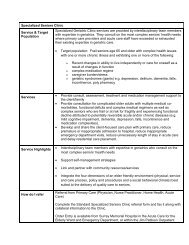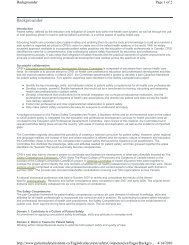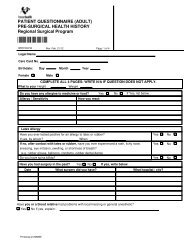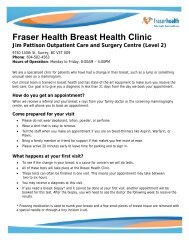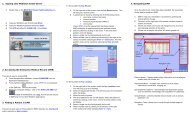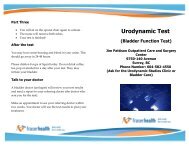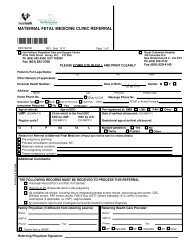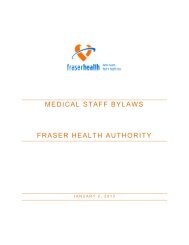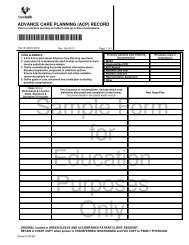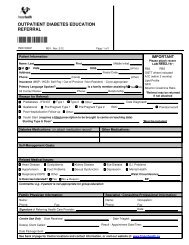- Page 1 and 2:
SteppedCareLevel 1PSP Mental Health
- Page 3 and 4:
Fold back this page before administ
- Page 5 and 6:
CBISCOGNITIVE BEHAVIOURAL INTERPERS
- Page 7 and 8:
Table of ContentsINTRODUCTION. . .
- Page 9 and 10:
IntroductionThe following modules h
- Page 11 and 12:
TipsTeachingSelling Strategies• E
- Page 13 and 14:
Flow ChartsThis module contains flo
- Page 15 and 16:
Patient NeedsTryThe Circle of Depre
- Page 17 and 18:
AnxiousSymptomsTryOverwhelmedChaoti
- Page 19 and 20:
Assessment ModuleThe Assessment Mod
- Page 21 and 22:
5 Energy levela. How would you rate
- Page 23 and 24:
15 Phobiasa. Any unrealistic or exc
- Page 25 and 26:
21 CAGEHow many drinks might you ha
- Page 27 and 28:
DIAGNOSTIC SCREENING WORKSHEET (CON
- Page 29 and 30:
Problem List Action PlanACTIVATIONR
- Page 31 and 32:
Self-Assessment QuestionnaireName:
- Page 33 and 34:
Self-Assessment ProfilePleaser: Hig
- Page 35 and 36:
Self-Assessment ProfileOver-Thinker
- Page 37 and 38:
Understanding Depression- Frequentl
- Page 39 and 40:
Depression: System-Wide CrashDepres
- Page 41 and 42:
Activation ModuleThe Activation Mod
- Page 43 and 44:
Depression’s Energy BudgetEvery d
- Page 45 and 46:
Small GoalsThe concentration, fatig
- Page 47 and 48:
Problem SolvingDepression can make
- Page 49 and 50:
Chunk the DayStrategies that give p
- Page 51 and 52:
Appreciation Exercise“Good for Me
- Page 53 and 54:
The Circle of DepressionCognitive-b
- Page 55 and 56:
Common Thinking ErrorsThe situation
- Page 57 and 58:
THOUGHT CHANGE PROCESS (CONTINUED)T
- Page 59 and 60:
Thought StoppingDepression often ma
- Page 61 and 62:
Good Guilt / Bad GuiltA world witho
- Page 63 and 64:
Setting LimitsMost of us like to be
- Page 65 and 66:
Is Anger a Problem for You?Tom arri
- Page 67 and 68:
Stress ResponseIntroduction to Rela
- Page 69 and 70:
Variation - Box BreathingABDOMINAL
- Page 71 and 72:
Body ScanPurpose• Body scan is a
- Page 73 and 74:
Stress BustersPurpose• Shorter te
- Page 75 and 76:
MindfulnessPurpose• Mindfulness i
- Page 77 and 78:
BreathMINDFULNESS MEDITATION (CONTI
- Page 79 and 80:
Healthy Habits for SleepingDepressi
- Page 81 and 82:
IT’S TRUE: YOU ARE WHAT YOU EAT!
- Page 83 and 84:
The Wellness WheelPHYSICALGROWTHSEL
- Page 85 and 86:
CBISCognitive Behavioural Interpers
- Page 87 and 88:
FLOW CHARTS……………………
- Page 89 and 90:
PANIC DISORDER• Anxiety “System
- Page 91 and 92:
The Many Faces of AnxietyPanic Diso
- Page 93 and 94:
Medical ConsiderationsMost Common M
- Page 95 and 96:
Anxiety“System-Wide Explosion”A
- Page 97 and 98:
Resources for Self-HelpOnline Resou
- Page 99 and 100:
GAD: Self-Assessment QuestionnaireN
- Page 101 and 102:
GAD: Self-Assessment ProfileHard Dr
- Page 103 and 104:
How Anxiety WorksTHOUGHTSBODYFEELIN
- Page 105 and 106:
Panic CircleEvent (public speaking)
- Page 107 and 108:
Your Emotional Thermometer• Imagi
- Page 109 and 110:
Anxiety EquationAnxiety arises out
- Page 111 and 112:
2. When something bad happens, I wo
- Page 113 and 114:
Coping CardsAnxious people often ma
- Page 115 and 116:
Problem SolvingAnxiety is strengthe
- Page 117 and 118:
Example: Kelly begins by making a l
- Page 119 and 120:
D.E.S.C. ScriptAssertiveness doesn
- Page 121 and 122:
Application forPsychiatric Medicati
- Page 123 and 124:
APPENDIX 2: WOMEN’S MENTAL HEALTH
- Page 125 and 126:
Pharmacotherapy in the Perinatal Pe
- Page 127 and 128:
Pharmacotherapy in the Perinatal Pe
- Page 129 and 130:
Pharmacotherapy in the Perinatal Pe
- Page 131:
FAMILY PHYSICIAN GUIDE | ADDRESSING
- Page 134 and 135:
Olanzapine (Zyprexa)Tablets, wafers
- Page 136 and 137:
Consortium forOrganizationalMentalH
- Page 138 and 139:
3. Gather details on current andpre
- Page 140 and 141:
Task Two: ADVISE1. Provide meaning
- Page 142 and 143:
SUPPORTED SELF‐MANAGEMENT FOR DEP
- Page 144 and 145:
TABLE OF CONTENTSIntroduction 1What
- Page 146 and 147:
INTRODUCTIONTake a moment now to as
- Page 148 and 149:
WHAT IS DEPRESSION?The two most com
- Page 150 and 151: WHAT CAUSES DEPRESSION?People becom
- Page 152 and 153: WHAT CAUSES DEPRESSION?ThoughtsEach
- Page 154 and 155: WHAT CAUSES DEPRESSION?EmotionDepre
- Page 156 and 157: WHAT CAUSES DEPRESSION?ActionDepres
- Page 158 and 159: WHAT CAN YOU DO ABOUT DEPRESSION?MI
- Page 160 and 161: MORE ABOUT MEDICATIONMedication is
- Page 162 and 163: ANTIDEPRESSANT SKILLSIn this sectio
- Page 164 and 165: REACTIVATING YOUR LIFEStep 1: Ident
- Page 166 and 167: REACTIVATING YOUR LIFESmall DutiesE
- Page 168 and 169: REACTIVATING YOUR LIFEStep 2: Choos
- Page 170 and 171: REACTIVATING YOUR LIFEStep 3: Set r
- Page 172 and 173: REACTIVATING YOUR LIFEStep 4: Carry
- Page 174 and 175: THINKING REALISTICALLYNegatively di
- Page 176 and 177: THINKING REALISTICALLYStep 1: Learn
- Page 178 and 179: THINKING REALISTICALLYStep 3: Learn
- Page 180 and 181: THINKING REALISTICALLYStep 3: Learn
- Page 182 and 183: THINKING REALISTICALLYStep 4: Pract
- Page 184 and 185: SOLVING PROBLEMS EFFECTIVELYStep 1:
- Page 186 and 187: SOLVING PROBLEMS EFFECTIVELYStep 2:
- Page 188 and 189: SOLVING PROBLEMS EFFECTIVELYStep 3:
- Page 190 and 191: SOLVING PROBLEMS EFFECTIVELYStep 5:
- Page 192 and 193: SOLVING PROBLEMS EFFECTIVELYStep 7:
- Page 194 and 195: REDUCING THE RISK OF RELAPSEPlan ah
- Page 196 and 197: Congratulations! You have now made
- Page 198 and 199: SUGGESTED READINGON DEPRESSION AND
- Page 202 and 203: SLEEPStress, anxiety, and depressio
- Page 204 and 205: CAFFEINECaffeine stimulates the sym
- Page 206 and 207: CHALLENGING DEPRESSIVE THOUGHTSSitu
- Page 208 and 209: PROBLEM SOLVINGACTION ADVANTAGES DI
- Page 210 and 211: AnxietyDementiaDementiaBipolar155
- Page 212 and 213: Practice Support ProgramGeneralized
- Page 214 and 215: Montreal Cognitive Assessment(MoCA)
- Page 216 and 217: Serial 7s: Administration: The exam
- Page 218 and 219: Appendix CNAME OF PATIENTStandardiz
- Page 220 and 221: Item 11Scoring WORLD backwards (ins
- Page 222 and 223: Appendix CStandardized Mini Mental
- Page 224 and 225: SCORING THE MOOD DISORDERQUESTIONNA
- Page 226 and 227: FORM 4MENTAL HEALTH ACT[ Sections 2
- Page 228 and 229: CommunityMHSU ReferralFormBounceBac
- Page 230 and 231: REFERRAL FORMMental Health and Subs
- Page 232 and 233: MENTAL HEALTH AFTER HOURSPLEASE LEA
- Page 234 and 235: DOCUMENTATION REQUIRED UPON REFERRA
- Page 236 and 237: Adult Eating Disorders ProgramRefer
- Page 238 and 239: Medical History:Medical causes of l
- Page 240 and 241: Who Are We?This is a specialized pr
- Page 242 and 243: Fraser South Eating Disorders Progr
- Page 244 and 245: Medical History:Medical causes of l
- Page 246 and 247: Fraser South Eating Disorders Progr
- Page 248 and 249: Medical History:Medical causes of l
- Page 250 and 251:
Fraser East:This program is part of
- Page 252 and 253:
Fact SheetPanic Disorder GroupDoes
- Page 254 and 255:
Fact SheetGeneralized Anxiety Group
- Page 256 and 257:
4 th Floor Sherbrooke Centre Tel (6
- Page 258 and 259:
Early Psychosis Intervention Progra
- Page 260 and 261:
*Additional Resources*For Informati
- Page 262 and 263:
Mental Healthand Addiction… suppo
- Page 264 and 265:
Fraser Health Mental Healthand Addi
- Page 266 and 267:
ADDICTION SERVICESAddiction Service
- Page 268 and 269:
ADDICTION SERVICESYouth Addictions
- Page 270 and 271:
ADDICTION SERVICES6. Long-term Resi
- Page 272 and 273:
MENTAL HEALTH SERVICESMental Health
- Page 274 and 275:
MENTAL HEALTH SERVICESDelta Mental
- Page 276 and 277:
MENTAL HEALTH SERVICES4. Community
- Page 278 and 279:
MENTAL HEALTH SERVICESMinistry of E
- Page 280 and 281:
MENTAL HEALTH SERVICES7. Residentia
- Page 282 and 283:
Mental Health & AddictionsHEALTHY L
- Page 284 and 285:
Client name: ______________________
- Page 286 and 287:
Client name: ______________________
- Page 288 and 289:
Taking Wellness to Heart! Metabolic
- Page 290 and 291:
Mental Health and Substance Use Rev
- Page 292 and 293:
Collaborative Care Process Map-Epis
- Page 294:
Fax the Special Authority Request t
- Page 301:
o o o o o o o • • • o o o o o



